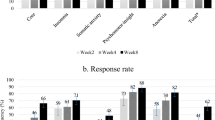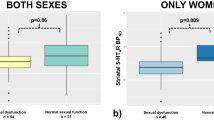Abstract
Sexual dysfunction (SD) is a troublesome adverse effect of selective serotonin reuptake inhibitors (SSRIs). A variety of mechanisms might be involved in the occurrence of SD but the exact mechanism is still not clear. Genetic variations among patients treated with SSRIs are strong determinants of intolerance and poor compliance. The present study aimed to determine the relationship between serotonin‐2A receptor (HTR2A) gene −1438A/G and 102T/C polymorphisms, serotonin transporter gene (SLC6A4) 5-HTT-linked polymorphic region (5-HTTLPR) insertion/deletion variant and brain-derived neurotrophic factor (BDNF) gene Val66Met polymorphisms and the occurrence of SD adverse effect in major depressive disorder patients treated with citalopram (CIT) or sertraline (SERT). The result from this investigation revealed that the −1438A/G and 102T/C polymorphisms appear to be associated with the SD induced by CIT. It was also demonstrated that patients receiving SERT, carrying T allele of HTR2A or L allele of 5-HTTLPR more likely to experience SD. Most important overall finding of the study is the combined effects of −1438A/G, 102T/C, and 5-HTTLPR polymorphisms. In a logistic regression model, the occurrence of SD increased with the number of risky alleles. As compared with subjects receiving SERT with few risky (≤2) alleles, those with had 5–6 alleles had an increased SD risk. After all, according to these findings, −1438A/G, 102T/C, and 5-HTTLPR polymorphisms could be considered as promising pharmacogenetic biomarkers in CIT/SERT treatment in major depressive disorder (MDD) patients to avoid the occurrence of SD.
This is a preview of subscription content, access via your institution
Access options
Subscribe to this journal
Receive 6 print issues and online access
$259.00 per year
only $43.17 per issue
Buy this article
- Purchase on Springer Link
- Instant access to full article PDF
Prices may be subject to local taxes which are calculated during checkout
Similar content being viewed by others
References
Fitzgerald KT, Bronstein AC. Selective serotonin reuptake inhibitor exposure. Top Companion Anim Med. 2013;28:13–7.
Baldwin DS, Anderson IM, Nutt DJ, Bandelow B, Bond A, Davidson JR, et al. Evidence-based guidelines for the pharmacological treatment of anxiety disorders: recommendations from the British Association for Psychopharmacology. J Psychopharmacol. 2005;19:567–96.
Stevenson JM, Bishop JR. Genetic determinants of selective serotonin reuptake inhibitor related sexual dysfunction. Pharmacogenomics. 2014;15:1791–806.
Jacobsen PL, Mahableshwarkar AR, Chen Y, Chrones L, Clayton AH. Effect of vortioxetine vs. escitalopram on sexual functioning in adults with well-treated major depressive disorder experiencing SSRI-induced sexual dysfunction. J Sex Med. 2015;12:2036–48.
Degner D, Grohmann R, Kropp S, Ruther E, Bender S, Engel RR, et al. Severe adverse drug reactions of antidepressants: results of the German multicenter drug surveillance program AMSP. Pharmacopsychiatry. 2004;37(Suppl 1):S39–45.
Perlis RH, Laje G, Smoller JW, Fava M, Rush AJ, McMahon FJ. Genetic and clinical predictors of sexual dysfunction in citalopram-treated depressed patients. Neuropsychopharmacology. 2009;34:1819–28.
Strohmaier J, Wust S, Uher R, Henigsberg N, Mors O, Hauser J, et al. Sexual dysfunction during treatment with serotonergic and noradrenergic antidepressants: clinical description and the role of the 5-HTTLPR. World J Biol Psychiatry. 2011;12:528–38.
Bull SA, Hunkeler EM, Lee JY, Rowland CR, Williamson TE, Schwab JR, et al. Discontinuing or switching selective serotonin-reuptake inhibitors. Ann Pharmacother. 2002;36:578–84.
Bishop JR, Chae SS, Patel S, Moline J, Ellingrod VL. Pharmacogenetics of glutamate system genes and SSRI-associated sexual dysfunction. Psychiatry Res. 2012;199:74–6.
Uckun Z, Baskak B, Ozel-Kizil ET, Ozdemir H, Devrimci Ozguven H, Suzen HS. The impact of CYP2C19 polymorphisms on citalopram metabolism in patients with major depressive disorder. J Clin Pharm Ther. 2015;40:672–9.
Demirbugen OzM, Uckun Z, Yuce-Artun N, Baskak B, Ozdemir H, Kizil Ozel T, et al. The relationship between the serotonin 2A receptor gene -1438A/G and 102T/C polymorphisms and citalopram/sertraline-induced nausea in major depressed patients. Hum Psychopharmacol. 2018;33:e2673.
Garfield LD, Dixon D, Nowotny P, Lotrich FE, Pollock BG, Kristjansson SD, et al. Common selective serotonin reuptake inhibitor side effects in older adults associated with genetic polymorphisms in the serotonin transporter and receptors: data from a randomized controlled trial. Am J Geriatr Psychiatry. 2014;22:971–9.
Clayton AH, Croft HA, Handiwala L. Antidepressants and sexual dysfunction: mechanisms and clinical implications. Postgrad Med. 2014;126:91–9.
American Psychiatric Association. Diagnostic and statistical manual of mental disorders (Text Revision). 4th ed. Washington: American Psychiatric Association; 2000.
Gorgens KA. Structured clinical interview For DSM-IV (SCID-I/SCID-II). In: Kreutzer JS, DeLuca J, Caplan B, (eds.) Encyclopedia of clinical neuropsychology. New York, NY: Springer; 2011. p. 2410–7.
Yuce-Artun N, Baskak B, Ozel-Kizil ET, Ozdemir H, Uckun Z, Devrimci-Ozguven H, et al. Influence of CYP2B6 and CYP2C19 polymorphisms on sertraline metabolism in major depression patients. Int J Clin Pharm. 2016;38:388–94.
Lingjaerde O, Ahlfors UG, Bech P, Dencker SJ, Elgen K. The UKU side effect rating scale. A new comprehensive rating scale for psychotropic drugs and a cross-sectional study of side effects in neuroleptic-treated patients. Acta Psychiatr Scand Suppl. 1987;334:1–100.
Hamilton M. Development of a rating scale for primary depressive illness. Br J Soc Clin Psychol. 1967;6:278–96.
Frey UH, Bachmann HS, Peters J, Siffert W. PCR-amplification of GC-rich regions: ‘slowdown PCR’. Nat Protoc. 2008;3:1312–7.
Borroni B, Archetti S, Costanzi C, Grassi M, Ferrari M, Radeghieri A, et al. Role of BDNF Val66Met functional polymorphism in Alzheimer’s disease-related depression. Neurobiol Aging. 2009;30:1406–12.
Bishop JR, Ellingrod VL, Akroush M, Moline J. The association of serotonin transporter genotypes and selective serotonin reuptake inhibitor (SSRI)-associated sexual side effects: possible relationship to oral contraceptives. Hum Psychopharmacol. 2009;24:207–15.
Liang CS, Ho PS, Chiang KT, Su HC. 5-HT2A receptor -1438 G/A polymorphism and serotonergic antidepressant-induced sexual dysfunction in male patients with major depressive disorder: a prospective exploratory study. J Sex Med. 2012;9:2009–16.
Masiran R, Sidi H, Mohamed Z, Mohamed Saini S, Nik Jaafar NR. Association between 5HT2A polymorphism and selective serotonin re-uptake inhibitor (SSRI)-induced sexual desire disorder (SDD) among Malaysian women. Asia Pac Psychiatry. 2013;5(Suppl 1):41–9.
Gu L, Long J, Yan Y, Chen Q, Pan R, Xie X, et al. HTR2A-1438A/G polymorphism influences the risk of schizophrenia but not bipolar disorder or major depressive disorder: a meta-analysis. J Neurosci Res. 2013;91:623–33.
Parsons MJ, D’Souza UM, Arranz MJ, Kerwin RW, Makoff AJ. The -1438A/G polymorphism in the 5-hydroxytryptamine type 2A receptor gene affects promoter activity. Biol Psychiatry. 2004;56:406–10.
Bitran D, Hull EM. Pharmacological analysis of male rat sexual behavior. Neurosci Biobehav Rev. 1987;11:365–89.
Watanabe N, Omori IM, Nakagawa A, Cipriani A, Barbui C, Churchill R, et al. Mirtazapine versus other antidepressive agents for depression. Cochrane Database Syst Rev. 2011;12:CD006528.
Clayton AH, Pradko JF, Croft HA, Montano CB, Leadbetter RA, Bolden-Watson C, et al. Prevalence of sexual dysfunction among newer antidepressants. J Clin Psychiatry. 2002;63:357–66.
Stryjer R, Spivak B, Strous RD, Shiloh R, Harary E, Polak L, et al. Trazodone for the treatment of sexual dysfunction induced by serotonin reuptake inhibitors: a preliminary open-label study. Clin Neuropharmacol. 2009;32:82–4.
Graf H, Walter M, Metzger CD, Abler B. Antidepressant-related sexual dysfunction—perspectives from neuroimaging. Pharm Biochem Behav. 2014;121:138–45.
Pullar IA, Carney SL, Colvin EM, Lucaites VL, Nelson DL, Wedley S. LY367265, an inhibitor of the 5-hydroxytryptamine transporter and 5-hydroxytryptamine(2A) receptor antagonist: a comparison with the antidepressant, nefazodone. Eur J Pharm. 2000;407:39–46.
Clayton AH, Montejo AL. Major depressive disorder, antidepressants, and sexual dysfunction. J Clin Psychiatry. 2006;67 Suppl 6:33–7.
Clayton AH. Sexual function and dysfunction in women. Psychiatr Clin North Am. 2003;26:673–82.
Madeo B, Bettica P, Milleri S, Balestrieri A, Granata AR, Carani C, et al. The effects of citalopram and fluoxetine on sexual behavior in healthy men: evidence of delayed ejaculation and unaffected sexual desire. A randomized, placebo-controlled, double-blind, double-dummy, parallel group study. J Sex Med. 2008;5:2431–41.
Perlis RH, Mischoulon D, Smoller JW, Wan YJ, Lamon-Fava S, Lin KM, et al. Serotonin transporter polymorphisms and adverse effects with fluoxetine treatment. Biol Psychiatry. 2003;54:879–83.
Bishop JR, Moline J, Ellingrod VL, Schultz SK, Clayton AH. Serotonin 2A -1438 G/A and G-protein Beta3 subunit C825T polymorphisms in patients with depression and SSRI-associated sexual side-effects. Neuropsychopharmacology. 2006;31:2281–8.
Acknowledgements
This work is supported, in part, by The Scientific and Technological Research Council of Turkey, Ankara, Turkey (Project 109S147) and The Coordinatorship of Scientific Research Projects of Ankara University, Turkey (Project 17H0237003).
Author information
Authors and Affiliations
Corresponding author
Ethics declarations
Conflict of interest
The authors declare that they have no conflict of interest.
Additional information
Publisher’s note Springer Nature remains neutral with regard to jurisdictional claims in published maps and institutional affiliations.
Rights and permissions
About this article
Cite this article
Oz, M.D., Baskak, B., Uckun, Z. et al. Association between serotonin 2A receptor (HTR2A), serotonin transporter (SLC6A4) and brain-derived neurotrophic factor (BDNF) gene polymorphisms and citalopram/sertraline induced sexual dysfunction in MDD patients. Pharmacogenomics J 20, 443–450 (2020). https://doi.org/10.1038/s41397-019-0127-8
Received:
Revised:
Accepted:
Published:
Issue Date:
DOI: https://doi.org/10.1038/s41397-019-0127-8
This article is cited by
-
Exploring the Potential Antidepressant Mechanisms of Pinellia by Using the Network Pharmacology and Molecular Docking
Metabolic Brain Disease (2022)
-
Associations between the 1438A/G, 102T/C, and rs7997012G/A polymorphisms of HTR2A and the safety and efficacy of antidepressants in depression: a meta-analysis
The Pharmacogenomics Journal (2021)



